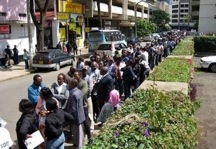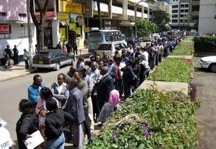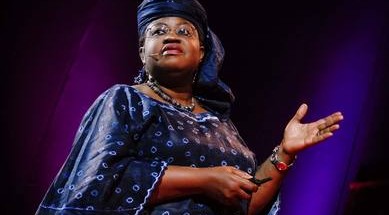Kenyans Queue To Vote In Landmark Elections
konknaijagirl | On 04, Mar 2013
Kenyans are voting in an election that observers describe as the most important in the country’s history.
Long queues are reported nationwide and voters’ main complaint has been having to wait under a hot sun.
But there has been a series of violent incidents around the port town of Mombasa, with at least five police officers killed in one attack.
Authorities have urged Kenyans to avoid the widespread bloodshed that followed the disputed 2007 election.
More than 1,000 people died in ethnic and political violence following claims the poll had been rigged.
One of the frontrunners in the presidential poll, Uhuru Kenyatta, is due to face trial at the International Criminal Court (ICC) next month in connection with the 2007 violence – he denies organising attacks.
His main rival is Prime Minister Raila Odinga, who says he was cheated of victory last time.
Biometric kits fail
After he cast his ballot, Mr Odinga said he would accept defeat – but that he was confident of victory in the first round.
“I will congratulate the winner,” he said.
Mr Kenyatta also sounded a conciliatory note, saying the president would represent the whole country and that any disputes should be taken to court.
Reports from around the country suggested long lines of voters had formed even before polling stations opened – and some voters, such as those in Eldoret, are waiting up to 10 hours to vote.
Some technical difficulties were reported with newly instituted biometric voting kits – designed to counter claims of vote-rigging and long delays in announcing poll results that were partly blamed for the violence in 2007.
In places, electoral officials are having to use the manual voter registers, delaying voting. But Lilian Mahiri-Zaja, vice-chair of Kenya’s independent electoral commission, said the registers were complete and there was no reason why the election should not be credible.
Five police officers and at least six other people – including several attackers – died in the assault in the early hours in Changamwe, half an hour’s drive inland from the centre of Mombasa.
There have been further disturbances in the town of Kilifi, north of Mombasa, where six civilians were killed, but details of the incident remain sketchy.
In other developments:
The BBC’s Bashkas Jugsodaay in Garissa says there were three explosions in three different polling stations in Mandera, a town near the border with Somalia, as officials were preparing for polls to open. One person died, reports said
As well as the two deadly attacks near Mombasa, a third attack was reported in a village near Mishomoroni, but there was no information about casualties
In Kiharu, Muranga county, a 72-year-old woman fainted and died while waiting to cast her vote
It was unclear whether the deaths around Mombasa were election-related, but the Kenyan police chief said one of the attacks involved over 200 gang members, and in response he was sending an additional 400 officers to the area.
Some blamed a separatist group, the Mombasa Revolutionary Council (MRC) – which has called for an election boycott – for the incident in Changamwe, but others suggested it was just a convenient scapegoat.
Two-horse race
Waiting in line outside polling stations in Nairobi hours before polls opened, the atmosphere was calm and people chanted “peace”, reports the BBC’s Gabriel Gatehouse.
In Garissa, frustration grew in the long queues as the heat beat down, our correspondent reports. Some used umbrellas to shelter from the sun and others bought water to pour over their heads.
Kenyans will choose a president, members of parliament and senators, county governors and members of 47 county assemblies.
However, our correspondent in the capital says all eyes are on the presidency.
Eight candidates are standing but it is essentially a two-horse race pitting Mr Odinga against Mr Kenyatta, he says.
Risk of violence
Some observers say they are particularly concerned about violence erupting should neither of the two frontrunners poll more than 50% – in which case the vote will go to a run-off, probably on 11 April.
Mr Kenyatta, son of Kenya’s founding father Jomo Kenyatta, is due to stand trial at the ICC in April for his alleged role in orchestrating the violence five years ago.
Mr Kenyatta’s running mate, William Ruto, has also been indicted. Both men deny any wrongdoing.
The 2007 violence broke out after Mr Odinga claimed he had been cheated of victory by supporters of President Mwai Kibaki.
Supporters of the rival candidates, from different ethnic groups, took up arms against each other. Mr Odinga later joined a government of national unity under a peace deal.
The underlying sources of tension in the 2007-8 election remain, and in some parts have escalated, with the risk of violence “perilously high”, warns Human Rights Watch.
It says the “near total impunity” of the perpetrators of violence has left them free to rape and kill again.
Some 99,000 police officers have been deployed around the country.
The polling stations are open from 06:00 to 17:00 local time (03:00-14:00 GMT), though officials say some may have to stay open until late into the night to allow everyone to vote.
Presidential candidates must secure support from across the country to be declared the winner, so they cannot just rely on support from their ethnic groups, as has been the case in previous elections.
Official results will be announced by 11 March by the electoral commission.















